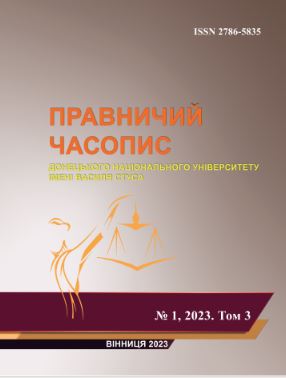International Legal Status of Unrecognized States
DOI:
https://doi.org/10.31558/2786-5835.2023.1.3.9Keywords:
international law; state; state recognition; unrecognized states; UN Charter; declarative and constitutive theory; right of peoples to self-determination; territorial integrity; occupied territoryAbstract
The article is devoted to the analysis of the international legal status of unrecognized states in the light of international socio-political relations in the twenty-first century. The authors analyze various approaches to the definition of «unrecognized state» and develop their own definition of this concept on their basis.
Special attention is paid to the characteristic features inherent in unrecognized states as an important aspect in the formation of their special political and legal status. These include: declaration of sovereignty; lack of international recognition; limited international relations; political instability; achievement of de facto independence; demonstration of a desire to obtain de jure independence.
The author examines the geopolitical, legal, ethno-cultural, socio-economic, and historical prerequisites that lead to the formation of such political entities on the territories of modern states. The author analyzes declarative and constitutional approaches to the formation of the status of unrecognized states. It is established that in the modern world none of these approaches exists in its pure form.
Attention is drawn to the need to regulate the process of overcoming the contradiction between the principle of the right of peoples to self-determination and the principle of territorial integrity, to clearly separate the concepts of «unrecognized state» and «temporarily occupied territory», and to create international mechanisms for the recognition of newly formed states.
The author determines that proper regulation of the international legal status of unrecognized states will contribute to the development of their political system and economy, provide access to international organizations and markets, and facilitate cooperation with other sovereign states.
It is emphasized that the implementation of scientifically based international legal norms and mechanisms regulating the process of recognition of newly formed states will contribute to the strengthening of the international system and the expansion of international cooperation between states.
References
Бабик М. Щодо визначення міжнародно-правового статусу невизнаних держав у сучасному світі. The IV International Scientific and Practical Conference «The latest implementation of technologies in education». 2022, November 21–23, Munich, Germany. Р. 149–153. URL: https://eu-conf.com/ua/events/the-latest-implementation-of-technologies-in-education/ (дата звернення: 29.05.2023).
Старенок І. П., Струк Є. О. Особливості визнання невизнаних держав. Підсумки розвитку наукової думки: зб. наук. праць «ΛΌГOΣ» з матер. міжнар. наук.-практ. конф., м. Івано-Франківськ, 5 грудня, 2018 р. Вінниця: ГО «Європейська наукова платформа», 2018. Т. 2. С. 39–42.
Тараненко М., Афанасьєв Д. Проблема невизнаних та частково визнаних держав на міжнародній арені. Jurnalul juridic national: teorie şi practică. 2019. № 37(3). С. 170–173.
Іщенко В. В. Невизнані та частково визнані держави в сучасному міжнародному праві. Вісник Національного технічного університету України «Київський політехнічний інститут». 2016. № 3/4 (31/32). С. 209–215.
Пікуля Т. Правовий статус невизнаних політико-територіальних утворень. Вітчизняна наука на зламі епох: проблеми та перспективи розвитку: Матеріали Всеукраїнської науково-практичної інтернет-конференції. Збірник наукових праць. Переяслав-Хмельницький, 2019. Вип. 48. С. 54–56.
Тимченко Л. Д., Кононенко В. П. Міжнародне право: підручник. Київ: Знання. 2012. 631 с.
Далявська Т. П. Феномен невизнаних держав: політологічний аналіз: дис. … канд. політ. наук: 23.00.02; ВНЗ України «Університет економіки та права «Крок». Київ, 2016. 230 с.
Дзюба Я. О., Остафійчук О. Ю. Невизнані держави сучасного світу: проблеми міжнародно-правового визнання і шляхи їх подолання. Вісник пенітенціарної асоціації України. 2020. № 3(13). С. 152–162.
Криштоп С. В. Особливості правового статусу невизнаних держав. Young Scientist. 2017. № 11(53). С. 893–896.
Войціховський А. В. Міжнародне право: підручник. Харків: ХНУВС, 2020. 544 с.
Говорова Я. Невизнані держави: сутність поняття та проблеми міжнародно-правового визнання. Підприємництво, господарство і право. 2017. № 11. С. 238–240.
Декларація про принципи міжнародного права, що стосуються дружніх відносин та співробітництва між державами відповідно до Статуту Організації Об’єднаних Націй від 24.10.1970 р. URL: https://www.un.org/ru/documents/decl_conv/declarations/intlaw_principles.shtml (дата звернення: 29.05.2023).
Войцехівський В. В., Марчук І. В., Логвиненко Є. С. Міжнародно-правовий статус «невизнаних держав» як особливих політико-територіальних утворень. Право і безпека. 2022. № 1(84). С. 115–123.
Статут Організації Об’єднаних Націй від 26.06.1945 р. URL: https://unic.un.org/aroundworld/unics/common/documents/publications/uncharter/UN%20Charter_Ukrainian.pdf (дата звернення: 29.05.2023).
Заключний акт Наради з безпеки та співробітництва у Європі від 01.08.1975 р. URL: https://zakon.cc/law/document/read/994_055 (дата звернення: 29.05.2023).

